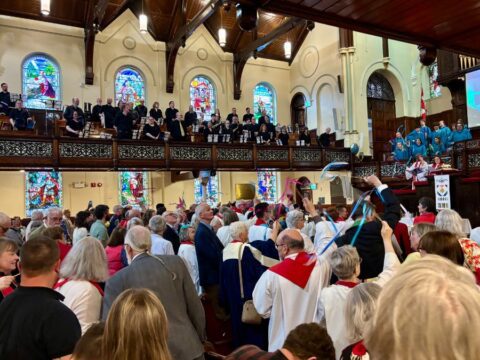Breaking up is hard to do. When you are a church minister, it’s particularly challenging. There’s not only the fishbowl of congregational life to contend with, but also the real or self-imposed holier-than-thou expectations that somehow ministers ought to be immune to marital dysfunction. These moral expectations are hammered home with biblical passages like the one in Mark where Jesus supposedly says, “Anyone who divorces his wife and marries another woman commits adultery against her. And if she divorces her husband and marries another man, she commits adultery.”
Despite the pressures to keep relationships intact, Statistics Canada reports that 41.3 percent of Canadian marriages end in divorce. Other stats reveal that I am frustratingly textbook. Average age of divorce for Canadian women? 41 years. Check. Average duration of marriages ending in divorce? 14.5 years. Check. And like 32 percent of divorcees, we have more than one child.
I didn’t leave my marriage easily. My ex (also a United Church minister) and I discussed it for nearly eight years before separating. Even though we could see it coming, I understand why divorce ranks second under “death of spouse” in the list of the top 10 most stressful life experiences. It’s not so much the obvious stress that you can anticipate (having to break the news to family, radically changing living arrangements and suffering financial setbacks), but rather the unexpected stuff: the lonely nails in the wall where my son took down all the family photos one day, saying, “We’re not a family anymore”; the wedding ring that sits in the drawer of my bedside table (I haven’t yet decided the most faithful way to dispose of it); and the half-finished deck we abandoned when we made the decision.
Divorce is a loss. It leaves a hole in a web of relationships. The private split happens long before the public divorce, but most people were shocked when I broke the news.
“You’re moving on too fast. It’s too soon,” a well-meaning friend commented.
“We’ve been talking about this for nearly a decade. How many more years should I stall my life so that you can get comfortable with how I’ve decided to live it?” I responded angrily, exhausted at having to shoulder other people’s grief as well as my own.
It’s hard to hear judgment while stewing in failure.
All divorces signify failure of some kind: the failure to have discerned well, to have maintained or mended the relationship, to have kept a stable home environment for children. Ministers feel this failure as acutely as everyone else, but moral expectation compounds it. Clergy preach regularly about healthy relationships, offer counsel about wise discernment and make a living extolling the virtues of love. When they divorce, the shame of not being able to walk the talk is on full display. To top it off, ministers preside over rituals that conjure their biggest failure: weddings.
“At first I thought, ‘I can’t do weddings. I failed at this. I can’t marry other people,’” says Rev. Sarah Miller, minister at Eastminster United in Toronto. “It was so hard. The first 12 months of being separated, I had more weddings than ever. I felt like an imposter, like Adam Sandler in The Wedding Singer. Even baptisms were difficult, especially when there was a happy couple and a baby. It was hard to go home and be a single mom.”
Rev. Peter Woods agrees. Woods has been the minister at Trinity United in Smiths Falls, Ont., for nearly 20 years. He divorced seven years ago. “Weddings tap into grief, loss and failure. We are all aware of the limits of the human heart, our inadequacies. A wedding is a time for me where there is a bittersweet sense of that,” he says. “I don’t regret doing weddings, and I don’t find them difficult anymore. But there is a hollowness I feel in the midst of them sometimes that wasn’t there before my divorce.”
“If we worked in an office building, we wouldn’t have to do this,” I told my ex as we crafted a statement to send to church contacts. I wrestled with how much of my personal life is my congregation’s and colleagues’ business. Did writing the letter condone their right to access our private life? Would not writing it mean that we would have to explain repeatedly as people found out? What about the kids — if we remained silent, would they have to deal with parishioners who unknowingly assume their parents are still together? And how real could we be in relationships with people who don’t really know us or the struggles that make us human?
Eventually, we decided to call family and friends and send a short factual letter to church contacts. We were aware that a previous minister had to leave my ex’s congregation when a messy divorce prompted some in the congregation to take sides. So the letter spelled out what we didn’t want: side-taking, gossip, nosiness. And what we did: support, prayer, space to heal.
Woods recalls the Sunday morning he made the announcement that he and his wife, a volunteer church leader, were splitting. “I remember one woman being in tears. She said, ‘I understand what you said this morning, but my heart is breaking.’ She had this sense that we were a happy couple. Our two children were active, visible and loved. There were good feelings around us as a family.”
Rev. Shannon Tennant, minister at Shiloh-Sixth Avenue United in New Westminster, B.C., says that her congregation was wonderful. “We didn’t want to do a speech or a press release. I asked Council to spread the word, and they did. No one got nosy. A few people said, ‘We’re there for you.’ The Presbytery was more difficult.” Tennant was married to another clergy person. “As a clergy couple, your professional lives are so enmeshed. As much as the congregations weren’t nosy, our colleagues were,” she says. “Also, I was the secretary of Presbytery and felt like I needed to be super careful with [my ex]. If he made a motion, I wanted to be sure that I got the wording right. It was uncomfortable at times.”
Not all congregations are supportive. A minister’s professional life hinges on his or her relationship with congregants; an angry ex can do real professional damage by poisoning the congregation. Rev. Tracy Smith’s divorce was acrimonious. (We’ve changed her name to protect her identity because her ex is abusive.) On Sunday mornings following the separation, her ex would show up to church. Smith’s personnel committee didn’t want her to tell the congregation about the separation. So while the congregation unknowingly welcomed her former partner with open arms, the ex was heckling her. “I would get texts during the service like, ‘Nice sermon about integrity — you are such a liar.’ In another job, it would be frowned upon for an ex to show up like that. . . . I felt so vulnerable. I didn’t know if she would wind up costing me my job. Some ministers leave congregations when they get divorced so that they don’t have to deal with it.”
Miller worried that telling her congregation would compromise her ability to offer pastoral care. “If I tell them, I wondered if they weren’t going to be able to lean on me pastorally,” she says. “In a normal job, you would tell one or two bosses. You would tell your co-workers, and that would be it. There’s a whole community involved in this job, and the minister has a different relationship with the community than everyone else.”
Moving forward in the context of the community can be a challenge. Divorce generally requires learning new skills. I’ve learned how to put air in my tires, file taxes, open bank accounts and (shudder) date again. It’s not so easy to date as a clergy person, let alone in my 40s.
Dating as a mature adult is different than dating at 16. I don’t remember being so self-conscious. There’s the Internet now, too. Early on, I scrolled through a dating site. How would I profile myself? “Hi. I’m a slightly overweight, eccentric 41-year-old with two kids, two dogs and an ex who lives in the basement. I like to spend a lot of time alone, have some baggage and if you can’t talk philosophy, religion and art while engaging in some form of outdoor activity, don’t bother. Oh, and I’m a United Church minister.” Sexy. One colleague advised me to hide my profession online, not just because potential partners might find it off-putting but also because parishioners might log on. I decided Internet dating isn’t for me.
My first date, a colleague I met accidentally while looking for a church form, was a disaster. “I’ll be a dating train wreck,” I warned. True to my word, when I got to the Tim Hortons where we planned to meet, I was so nervous that I parked sideways. When I saw him bounding toward me across the parking lot, I lost the ability to speak. Didn’t say a word for an hour and a half. Told myself to imagine he was ugly. To think about it as a collegial relationship. Or an interview. Or nothing at all — just coffee. Remarkably, he is still hanging around.
Which raises a number of conundrums, not least of which is when to make introductions.
“It’s like, at some point you bring your significant other home to your parents. When you’re a minister, you bring them home to your congregants,” says Woods. “Some days, my [new] girlfriend was in church, and my ex-wife and kids were there, too. It’s a lot of complicated dynamics for a Sunday morning. But I have thought over the years that it is a natural extension of really understanding Christian community. . . . Life isn’t tidy. When as church leaders, we are living out the details of untidy lives, we are close to Gospel. The paradox of Jesus’ messy love for the world is, in a small way, echoed in the grief and complications of my life. Ultimately, it is a gift that I am called to share.”
My own experience, thankfully, hasn’t been negative. The congregation I’m serving has been respectful. In fact, the men’s club at church just informed me that they are having an open meeting to discuss how they can support their ministry team through personal and professional transitions. My ex’s congregation has offered prayers and casseroles. We joke that he might be eating better after our divorce than he ever did while we were married. While I feared how learning about my divorce might negatively affect my pastoral ministry, I have never had so many congregants line up to divulge the most painful aspects of their marriages. The public brokenness of my relationship has enabled a deeper ministry.
Rev. Rachel Campbell of Halifax was ordained last month and is studying clergy divorce for her MA thesis. “I actually feel more comfortable going into ministry as a divorced person after doing the research,” she says. “In all the stories, I heard a recurring theme of protectiveness. Yes, congregations are curious, and I heard about how difficult it is to live in a fishbowl, but I also heard about a lot of care and concern.”
Truth is, had we known our congregations would be as respectful as they are, we probably would have pulled the plug sooner. Don’t get me wrong — it hasn’t been a picnic. Our divorce, like everyone’s, has been painful. There are significant and unique pressures that come with the role of minister. Yet, for some, there are also significant blessings and unexpected benefits to airing the laundry. I’m one of the lucky ones. My parishioners don’t begrudge their minister’s humanity as much as I feared. By their grace, I’ve learned not to resent it as much either. In the end, my divorce has helped all of us become a little more human.
This story originally appeared in the June 2015 issue of The Observer with the title “Divorce in a fishbowl.”















